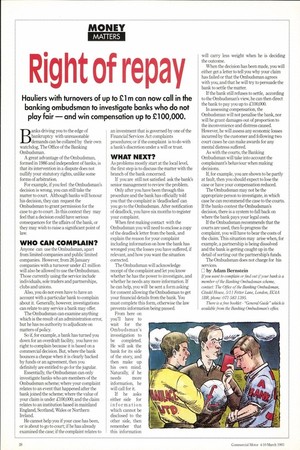Right of repay Hauliers with turnovers of up to C1m
Page 30

If you've noticed an error in this article please click here to report it so we can fix it.
can now call in the banking ombudsman to investigate banks who do not play fair — and win compensation up to £100,000.
Banks driving you to the edge of bankruptcy with unreasonable demands can be collared by their own watchdog, The Office of the Banking Ombudsman.
A great advantage of the Ombudsman, formed in 1986 and independent of banks, is that its intervention in a dispute does not nullify your statutory rights, unlike some forms of arbitration.
For example, if you feel the Ombudsman's decision is wrong, you can still take the matter to court. Although banks will honour his decision, they can request the Ombudsman to grant permission for the case to go to court. In this context they may feel that a decision could have serious consequences for the affairs of the bank, or they may wish to raise a significant point of law.
WHO CAN COMPLAIN?
Anyone can use the Ombudsman, apart from limited companies and public limited companies However, from 26 January companies with a turnover under million will also be allowed to use the Ombudsman. Those currently using the service include individuals, sole traders and partnerships, clubs and unions.
Also, you do not even have to have an account with a particular bank to complain about it. Generally, however, investigations can relate to any service a bank may offer.
The Ombudsman can examine anything which is the result of an administration error, but he has no authority to adjudicate on matters of policy.
So if, for example, a bank has turned you down for an overdraft facility, you have no right to complain because it is based on a commercial decision. But, where the bank bounces a cheque when it is clearly backed by funds or an agreement, then you definitely are entitled to go for the jugular.
Essentially, the Ombudsman can only investigate banks who are members of the Ombudsman scheme; where your complaint relates to an event that happened after the bank joined the scheme; where the value of your claim is under £100,000; and the claim relates to an institution based in mainland England, Scotland, Wales or Northern Ireland.
He cannot help you if your case has been, or is about to go to court; if he has already examined the case; if the complaint relates to an investment that is governed by one of the Financial Services Act complaints procedures; or if the complaint is to do with a bank's discretion under a will or trust.
WHAT NEXT?
As problems mostly start at the local level, the first step is to discuss the matter with the branch of the bank concerned.
If you are still not satisfied ask the bank's senior management to review the problem.
Only after you have been through this procedure and the bank has officially told you that the complaint is 'deadlocked' can you go to the Ombudsman. After notification of deadlock, you have six months to register your complaint.
When first making contact with the Ombudsman you will need to enclose a copy of the deadlock letter from the bank, and explain the reason for your complaint including information on how the bank has wronged you; the losses you have suffered, if relevant, and how you want the situation corrected.
The Ombudsman will acknowledge receipt of the complaint and let you know whether he has the power to investigate, and whether he needs any more information. If he can help, you will be sent a form asking for consent allowing the Ombudsman to get your financial details from the bank. You must complete this form, otherwise the law prevents information being passed.
From here on you'll have to wait for the Ombudsman's investigation to be completed. He will ask the bank for its side of the story, and then make up his own mind. Naturally, if he needs more information, he will call for it.
If he asks either side for information which cannot be disclosed to the other side, then remember that this information
















































































